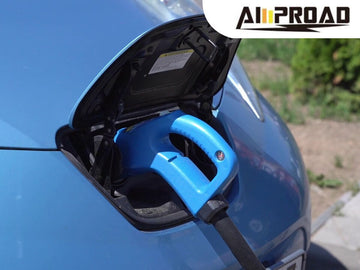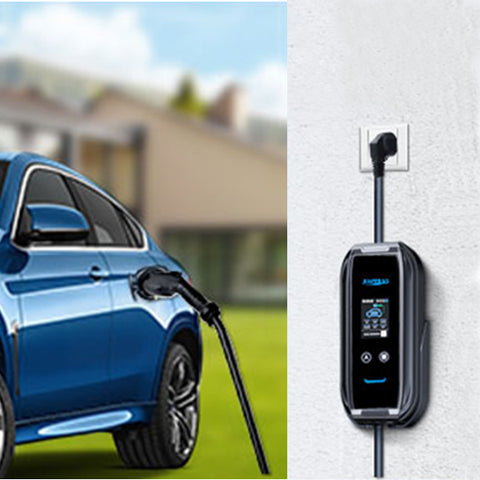
No, electric cars cannot currently charge themselves in the same way that gasoline-powered cars refuel themselves. Electric vehicles (EVs) rely on external sources of electricity to replenish their batteries. However, understanding why this is the case and exploring ongoing advancements in EV technology provides a fascinating glimpse into the future of sustainable transportation.
Why Self-Charging EVs Aren't Yet a Reality
The dream of electric cars that magically top up their own batteries is an alluring one. But unlike their gas-guzzling counterparts, EVs currently rely on external power sources to keep them rolling. Let's delve into the scientific and practical reasons why self-charging EVs remain on the horizon, not yet gracing our roads.
Energy Source
Unlike gasoline engines that burn fuel to generate power, electric motors use electricity stored in batteries. EVs lack an internal mechanism to create electricity on their own. They require an external source, like a charging station or a power grid connection, to replenish the battery's energy. Essentially, an EV's energy source must be recharged from an external supply of electricity.
Laws of Thermodynamics
The second law of thermodynamics states that usable energy tends to decrease over time. During any energy transfer process, some energy is inevitably lost as unusable heat. This principle underpins the limitation of self-charging capabilities. While regenerative braking in EVs captures some energy lost during braking to partially recharge the battery, it is not enough to fully recharge a depleted battery without an external source.
Ongoing Research and Development
Despite current limitations, significant research is underway in areas that could potentially lead to more self-sufficient EV charging experiences:
Solar Panels
Integrating solar panels onto the car's roof could collect solar energy and contribute to charging the battery. Although the amount of power generated might be limited and insufficient for a full charge, it can still provide supplementary power. For instance, solar panels might extend the range of an EV slightly or power auxiliary systems, reducing the overall demand on the main battery.
Wireless Charging
Wireless charging technology, while still in its early stages, holds immense promise for a seamless and user-friendly EV charging experience. Unlike the current method of plugging your car into a charging station, whether it's a Level 2 EV charger at home or a public DC fast EVCS charging station, wireless charging eliminates the need for physical connections altogether. This technology involves transmitting electricity wirelessly from a charging pad on the ground or embedded in a parking space directly to a receiver coil within the vehicle.
The convenience factor is undeniable. Imagine pulling into your garage or a designated parking spot and your EV automatically begins charging without the need to fumble with cables. This not only simplifies the charging process but also eliminates the potential frustration of tangled cords or incompatible plugs. Additionally, wireless charging could pave the way for automated charging systems, where robots or automated mechanisms could precisely position the charging pad underneath the vehicle, further enhancing the user experience.
However, it's important to remember that an external power source is still required for wireless charging. The charging pad itself doesn't generate electricity; it simply acts as a transmitter to efficiently transfer power from the grid or another source to the EV's battery. While the convenience factor is significant, the underlying infrastructure for wireless charging still needs to be developed and integrated into existing parking spaces and charging networks.
Despite these considerations, the potential benefits of wireless charging are undeniable. It could revolutionize the way we charge electric vehicles, making the process more convenient, efficient, and potentially even faster than plugging into a traditional Level 2 EV charger. As this technology matures and becomes more widely adopted, it could play a crucial role in accelerating EV adoption and paving the way for a more sustainable transportation future.
Advanced Battery Technology
The future of EV batteries holds exciting possibilities that could significantly enhance the ownership experience. Advancements in battery technology could lead to a future with two key improvements: increased capacity and faster charging times. Imagine batteries with much higher energy densities, allowing EVs to travel further on a single charge, reducing "range anxiety" and the need for frequent stops. This could be achieved through innovations like solid-state batteries, promising greater safety and potentially holding more energy in a smaller package. Additionally, faster-charging batteries could revolutionize the charging process. Imagine topping up your EV in a fraction of the time it currently takes, minimizing downtime and making charging as convenient as filling up a gas tank. These advancements would not only offer increased range and convenience but also potentially make EVs a more attractive option for a wider range of consumers.
Regenerative Braking
While regenerative braking is already a common feature in EVs, improving its efficiency could enhance its contribution to battery life. By capturing more energy during braking and coasting, the overall energy efficiency of the vehicle can be improved. Although this won't replace the need for external charging, it does help to extend the driving range between charges.
Future Prospects for Self-Sufficient EV Charging
Although self-charging electric cars are not yet a reality due to current technological and physical limitations, ongoing advancements hold promise for the future. Let's explore some potential developments that could revolutionize EV charging:
Dynamic Charging Systems
The future of EV charging might not be limited to stationary stations. One intriguing concept being explored is dynamic charging systems. These futuristic systems would allow EVs to charge while they're actually in motion! Imagine embedded coils lining the roadways, using the principle of magnetic induction to wirelessly transfer power directly to the vehicle's undercarriage as you drive. While this technology is still very much in its theoretical stages, the potential benefits are vast. Dynamic charging could drastically reduce the need for stationary charging stations, minimizing range anxiety and revolutionizing long-distance EV travel. However, significant infrastructural challenges remain. Implementing and maintaining a vast network of embedded charging coils would require substantial investment and technological advancements. Nevertheless, research and development in dynamic charging hold promise for a future where electric vehicles seamlessly integrate with the roadways, powering our journeys without ever needing to stop.
Energy Harvesting
Future advancements might also explore various forms of energy harvesting. Technologies that capture and convert ambient energy sources, such as kinetic energy from the vehicle's movement or thermal energy from the environment, could provide supplementary charging. Although these methods are unlikely to fully replace traditional charging, they could enhance the overall energy efficiency of EVs.
Integration with Renewable Energy Grids
The rise of renewable energy sources like solar and wind power brings exciting possibilities for a more sustainable future of EV charging. Imagine a world where your home EV charger isn't just convenient, but also environmentally friendly. This vision could become a reality by integrating EV charging infrastructure with renewable energy systems. Smart grids, capable of dynamically allocating energy from renewable sources like solar panels on your roof or wind farms in your region, could prioritize charging EVs during peak production times. This not only reduces reliance on non-renewable sources but also helps balance the demand and supply of electricity within the grid. By harnessing clean energy for EV charging, we can create a more sustainable transportation ecosystem, reducing our carbon footprint and paving the way for a future where electric vehicles are powered by the very elements that surround us.
Autonomous Charging Solutions
The development of autonomous charging solutions, such as robotic chargers or automated parking systems that position vehicles for optimal charging, could also enhance the convenience and efficiency of the charging process. These systems could ensure that vehicles are always charged and ready to go, without requiring manual intervention from drivers. The future of EV charging might involve a touch less human involvement. The development of autonomous charging solutions, like robotic chargers or automated parking systems with integrated charging, could significantly enhance convenience and efficiency. Imagine robotic arms equipped for charging that can maneuver around parked vehicles, automatically connecting to the charging port. Alternatively, automated parking systems could integrate charging pads, positioning vehicles for optimal power transfer during their stay. These advancements could ensure that EVs are always charged and ready to go, eliminating the need for drivers to manually connect to an EVSE charger, even for the fastest charging options. This would not only simplify the process but potentially free up valuable time currently spent managing the charging experience.
The Road to Self-Sufficiency
While electric cars cannot currently charge themselves in the same way gasoline cars refuel, advancements in technology are steadily pushing the boundaries of what is possible. Understanding the factors that prevent self-charging, such as the need for an external energy source and the laws of thermodynamics, provides insight into the challenges facing the EV industry.
However, research into solar panels, wireless charging, advanced battery technology, and other innovative solutions offers hope for a future where EV charging is more convenient, efficient, and potentially even self-sufficient. As these technologies mature, the dream of a fully autonomous, self-sustaining electric vehicle may become a reality, driving us closer to a sustainable and eco-friendly future.



